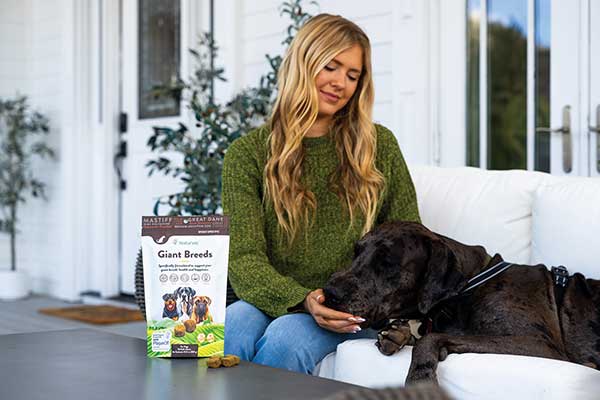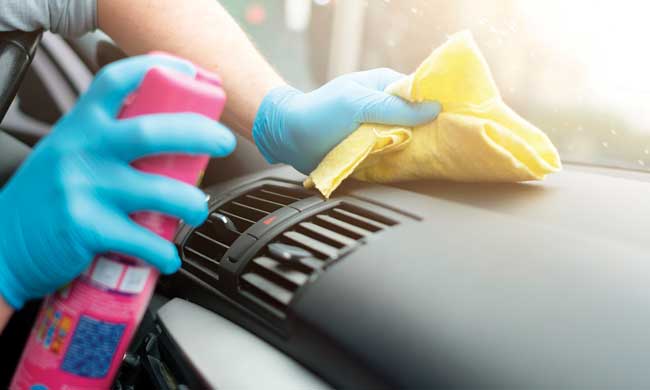Live Better
Supporting your pet’s health during summer

(Family Features) As a pet parent, you know your pet’s needs are continually evolving. That’s true during different stages of growth and even as the seasons change.
Part of supporting your pet throughout the year is understanding the specific risks that come with changing weather and special seasonal events. Supporting pets this summer can be easier with these tips:
Summer Health Concerns
It may be an exciting time of year for humans with all the extra activities, seasonal celebrations and travel, but those summer pastimes can add up to a whole lot of stress for pets. In addition, environmental factors like allergens and heat can affect them more than you realize.
 Allergies: Pets can be affected by many of the same allergens as humans, including grass, pollen and other vegetation that is more prevalent during warmer months. Watch for signs of trouble such as scratching, chewing, watery eyes and general discomfort. Veterinarians can offer advice on allergy support and supplements appropriate for your pet’s age, breed and size.
Allergies: Pets can be affected by many of the same allergens as humans, including grass, pollen and other vegetation that is more prevalent during warmer months. Watch for signs of trouble such as scratching, chewing, watery eyes and general discomfort. Veterinarians can offer advice on allergy support and supplements appropriate for your pet’s age, breed and size.- Fireworks: Summer tends to bring more loud noise and commotion in general, but this is especially true around the Fourth of July when explosions become the norm. If pets are fearful, it’s especially important to ensure they stay in well-secured areas since fireworks are a common cause of pets running away. If possible, find a safe spot within your house where outside noises are muffled. Provide some comfort items and check on them regularly. If they seem extremely distressed, vet-recommended anxiety treatments and supplements can help promote relaxation and soothe their nerves.
- Travel: If your pet suffers from separation anxiety, summer trips can be especially problematic. One solution is to take your pet with you, but that’s not always practical or even possible. When pets with separation anxiety stay behind, it’s a good idea to leave them with someone they know, and even better if that person can stay in your home so pets are in familiar surroundings. If that’s not an option, introducing pets to their caretaker or doing a trial run at the kennel can help ease their nerves. In extreme cases, you may need to consult with a vet about supplements that can help soothe pets in your absence.
- Dehydration: Just like humans, hotter temperatures make it easier to get dehydrated, which can lead to myriad health concerns. Ensure pets have access to fresh, clean and cool water at all times and be sure to alert your veterinarian if you notice any changes in their interest in drinking, as that can signal an issue. Also watch for signs of dehydration, such as weakness, less energy, changes in appetite and panting.
Managing Activity Levels
During the summer months, pets may be tempted to take it easy in the heat, or you may have the opposite problem: a pet that’s a little too active for the elements. Monitoring their activity level is important to ensure they don’t get overheated but also get adequate exercise to maintain a healthy weight and keep muscle tone strong. This may require getting creative about bringing playtime indoors or shifting your routine to accommodate walks early or late in the day when temperatures tend to be more forgiving.
Introducing Health Supplements
Monitoring pets’ health isn’t a one-size-fits-all effort. In fact, different breeds have distinct needs when it comes to exercise, behavioral training and even nutrition. Supplements, from multifunctional solutions to those targeting specific issues, can help complement regular food to ensure pets are getting all of the nutrients and preventative support they need to thrive. One comprehensive option is NaturVet’s Breed Specific Soft Chews supplement line, which is made up of five products that provide proactive support for distinct dog breed categories, including toy/small, bully, sport/working, doodle and giant.
The vet-formulated soft chew line was designed to offer a streamlined and personalized supplement approach for breeds with particular health needs. To support pets precisely as they are, each product offering is formulated for pure and mixed breed dogs alike, delivering tailored, wholesome ingredients to address joint, allergy, immune, heart, gut, anxiety and dental issues.
Find more advice for supporting your pet’s health this summer and beyond at naturvet.com.
Photo courtesy of Shutterstock (woman hugging dog)
SOURCE:
NaturVet
Live Better
Refunds to new rides: 3 essential tips

(Family Features) Tax refunds have started rolling in, which means many people are looking to use this influx of cash to make purchases they’ve been putting off. According to an Oxford Economics report, the amount of money received from income tax refunds this year could be among the highest in recent years, so many people may have more money in their pockets to spend this spring.
One purchase typically rises to the top this time of year: used vehicles. The Oxford report shows used vehicles are one of the most popular purchases for Americans during tax refund time as this coincides with higher resale values of used vehicles. When making this purchase, it’s important to consider several factors to make a smart financial decision.
Make Sure the Purchase Fits Within Your Budget
Data from Kelley Blue Book and Cox Automotive suggests average used car prices are around 50% less than new vehicle prices. Trusted used car companies and dealerships often feature a wide selection of inventory, including different makes and models, so customers can select a vehicle that excites them and fits within their budget.
“While there are several considerations to keep in mind when shopping for a vehicle, consumers should never exceed their budget,” said Laura D. Adams, personal finance expert, host of the “Money Girl” podcast and a paid Enterprise Car Sales spokesperson. “A vehicle that is near new is often an excellent sweet spot for consumers looking for quality without wanting to make the leap to purchase an expensive, new vehicle.”
Searching for a vehicle with a retailer you trust can help make it easy to stay within your budget. For example, with Enterprise Car Sales, the price listed is the price you’ll pay.
Keep the Monthly Payment Low
The more you can invest in the down payment on a vehicle, the lower your monthly cost will typically be and the less interest you will typically pay over the length of the loan. This can lead to lower, more manageable monthly payments.
“In setting a budget for a quality used vehicle, it’s important to consider the initial down payment, the monthly payments, and the interest,” Adams said. “When consumers can put a little more toward the initial down payment, while staying within budget, they often thank themselves later when they have lower monthly payments and less interest accrued.”
There are many online resources that can help consumers make this calculation. For example, an auto loan calculator can show you how a down payment can affect interest charges.
Purchase a Reliable Vehicle
No matter who you buy from, ensuring you are purchasing a high-quality, reliable vehicle is of the utmost importance. Do your research before signing on the dotted line and conduct a test drive if you can.
“When conducting your search, it’s important to put companies and dealerships you trust at the top of your list,” Adams said. “Maintenance costs can sometimes creep up down the road, so it’s important to make this significant purchase from a company or dealership you trust.”
Some dealers also provide additional benefits to help protect a purchase. For example, all vehicles purchased through Enterprise Car Sales are “Enterprise Certified,” pass a rigorous inspection by ASE-certified technicians and come with a 12-month or 12,000-mile limited powertrain warranty (whichever occurs first), 12 months of roadside assistance and a 7-day or 1,000-mile (whichever occurs first) buyback policy.
With a little research and careful planning, you can find a reliable used vehicle that excites you. Visit enterprisecarsales.com for more information.
SOURCE:
Enterprise Car Sales
Live Better
8 must-visit destinations for you next getaway

(Family Features) For many travelers, the thrill of discovering unique and memorable experiences ignites a desire for new adventures – whether gathering with family, escaping routines or celebrating milestones.
From the bustling cityscapes to serene beachfront retreats, Hyatt hotels offer guests and members memorable travel experiences in sought-after destinations from Chicago to Cancun and beyond.
If you’re craving a getaway, get inspired by these eight destinations and plan your next vacation at Hyatt.com.

Embark on Urban Adventures in Chicago
Presiding in the heart of downtown Chicago, Chicago Athletic Association, part of The Unbound Collection by Hyatt brand, is steps from iconic landmarks such as Millennium Park, the Art Institute of Chicago and Maggie Daley Park. The landmark hotel offers seven celebrated dining and drinking establishments and boasts 240 guestrooms and suites that blend modern amenities with nods to its historic, athletic roots with stunning views of Lake Michigan.

Enjoy Ski-In, Ski-Out Luxury
Whether looking for a luxury ski getaway or a mountain adventure, Grand Hyatt Vail and Park Hyatt Beaver Creek Resort and Spa offer something for everyone. Both offer direct access to the mountain and ski valet services, so skiers can forget about carrying gear or dealing with cold boots. The hotel hot tubs can help guests leave behind mountain soreness in a serene environment.

Relax, Play and Indulge in Tranquility
Nestled in Greater Palm Springs, Grand Hyatt Indian Wells Resort and Villasoffers world-class accommodations following a $64 million hotel-wide renovation, including redesigned guestrooms and luxury villas, refreshed meeting and event spaces, two new dining concepts and a reimagined pool complex featuring a lazy river, splash pad and dueling water slides. Plus, the on-site spas provide advanced treatments like IV hydration, custom massages, body scrubs, microneedling and more.

Make Yourself at Home in the Nation’s Capital
Located in the buzzing Wharf neighborhood near the National Mall with dazzling views of the Potomac River, Hyatt House Washington, D.C./The Wharf is an ideal spot to recharge before exploring historic Washington, D.C. The hotel, which is the perfect home base for exploring nearby attractions like The Smithsonian and the Lincoln Memorial, is home to rooftop pool views and on-site dining as well as spacious rooms with separate seating areas and sofa beds – making it the perfect home away from home.

Unwind in Orange County
Indulge in SoCal vibes at Hyatt Regency Irvine. Located in Irvine, California, you’ll be near some of the area’s top activities, including Disneyland, Newport Beach and shopping at South Coast Plaza. Take advantage of the hotel’s swimming sanctuary, which was redesigned as part of a $55 million hotel-wide renovation and features luxurious cabana options like fire-pit seating, hospitality cabanas or shaded retreats.

Escape to the Shores of Paracas Bay
Relax amid the natural beauty of Peru’s southern coast at The Legend Paracas Resort, part of the Destination by Hyatt brand, a family-friendly, oceanfront basecamp for adventure. Adjacent to Paracas National Park, the immersive resort provides opportunities to explore the Ballestas Islands on a thrilling boat tour, soar over the enchanting Nazca Lines on a private charter flight or conquer the Huacachina desert in dune buggies.

Retreat to Well-Being
Tucked among 23 secluded acres at the base of Camelback Mountain, Andaz Scottsdale Resort & Bungalows is a luxury resort within a desert oasis. Guests can embark on a journey of adventure and relaxation with rejuvenating treatments available at Palo Verde Spa & Apothecary, three luxurious pools, 185 spacious bungalows and suites, renowned dining, craft cocktails and more.

Experience All-Inclusive by the Sea
Nestled between the natural Bahia Petempich beach and the Caribbean Sea, Hyatt Ziva Riviera Cancun ignites your senses with dramatic ambiance, vibrant cuisine and modern amenities in a family-friendly atmosphere where food, drink and activities are all included. Surrounded by a lush jungle and sparkling waters, it offers a nearly endless list of activities for the whole family, including the serene Zen Spa and a winding water park.
SOURCE:
Hyatt
Live Better
Cost-efficient car detailing at home

(Family Features) Having your car professionally detailed is likely to set you back a chunk of change, but with the right supplies and a little spare time, you can get similar results at home.
Whether you’re washing away winter grime or just giving your ride some overdue attention, follow these steps to get your vehicle in tip-top shape.
Assess your vehicle’s condition. If there’s a specific problem you need to address, such as stains or excessive insect buildup on your front bumper, those are areas you’ll want to focus your time, energy and budget.
Purchase the necessary supplies. A car cleaning kit could simplify the shopping process, but you may need to supplement with additional items, such as a spot treater, to achieve the best results. The essentials include a sturdy bucket, washing mitt, soft bristle brush, soft rags, a dust rag, automotive soap, glass cleaner, a vinyl or interior-safe cleanser, vacuum and wax, if you wish.
Empty the vehicle. Removing all your personal possessions provides a blank slate for cleaning and prevents you from having to work around or worry about damaging your belongings. Also remove any elements of the vehicle you may want to clean separately, such as floor mats, console inserts and other removable pieces.
Tackle the interior. Start by removing debris from crevices and wiping away dust and other gunk. Then, with the initial layer of mess removed, go back and wipe down all surfaces using a cleanser. You can also clean the interior windows at this stage, and be sure to wipe down the console, especially if you have a touchscreen that is covered with fingerprints.
Vacuum thoroughly. Using a small vacuum or hose with strong suction, pay special attention to high-traffic areas and spaces where trash and debris tend to settle, such as between the seat and console. The floorboards will likely need the most attention, but don’t overlook the seats, and especially the area where the seat and back meet as this crevice can trap a great deal of dirt.
Clean the floor mats. Chances are good your floor mats rival the exterior for the dirt and grime they accumulate. Depending on how heavily soiled they are, and especially if they’re carpet-style mats, you may want to shampoo them after a deep vacuuming to remove stubborn stains.
Return belongings to the interior. Before you add everything back into your vehicle, take time to wipe down items and sort out any unnecessary clutter. It’s a good time to reorganize your storage areas to be sure the items you use frequently are in easy reach. You can also replenish supplies such as facial tissue and hand sanitizer.
Wash the exterior. Follow the instructions on the product’s label to wash your automobile’s exterior. Pay attention to special requirements such as allowing time for a bug remover to soak. In general, start with a rinse, followed by scrubbing with a mitt then an all-over rinse. Use a chamois towel or other drying cloth to avoid water spots.
Add finishing touches. If you’re using wax or planning on specialty treatments like tire cleaning, those will be among your final steps. Last but not least, clean the exterior windows with glass cleaner to remove streaks and leave them sparkling.
Find more practical vehicle maintenance tips at eLivingtoday.com.
Photo courtesy of Shutterstock
SOURCE:
eLivingtoday.com
-

 NEWS2 years ago
NEWS2 years ago2 hurt, 1 jailed after shooting incident north of Nocona
-

 NEWS1 year ago
NEWS1 year agoSuspect indicted, jailed in Tia Hutson murder
-

 NEWS2 years ago
NEWS2 years agoSO investigating possible murder/suicide
-

 NEWS2 years ago
NEWS2 years agoWreck takes the life of BHS teen, 16
-

 NEWS2 years ago
NEWS2 years agoMurder unsolved – 1 year later Tia Hutson’s family angry, frustrated with no arrest
-

 NEWS2 years ago
NEWS2 years agoSheriff’s office called out to infant’s death
-

 NEWS2 years ago
NEWS2 years agoBowie Police face three-hour standoff after possible domestic fight
-

 NEWS2 years ago
NEWS2 years agoDriver stopped by a man running into the street, robbed at knifepoint







